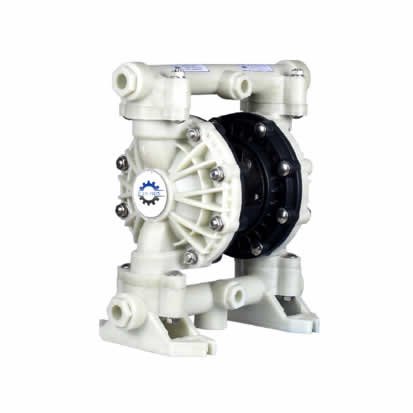
China Pumping Solutions Leader
Pneumatic diaphragm pump is a displacement pump with compressed air as the power and the volume change caused by the reciprocating deformation of the diaphragm, and its working principle is similar to that of the plunger pump. The pneumatic diaphragm pump is used in accordance with certain principles and methods, and is used in accordance with certain instructions and precautions in the specific operation procedures, which can produce important use roles and contributions, and play a good use value. The following points should be noted when operating with a pneumatic diaphragm pump: ensure that the maximum particles contained in the fluid do not exceed the maximum safe passing particle diameter standard of the pump. Tighten the pump and the connecting nozzle joints to prevent electrostatic sparks caused by vibration impact on the pump. Use an antistatic hose. To periodically check and test the reliability of the grounding system, the grounding resistance must be less than 100 ohms. Maintain good exhaust and ventilation, away from flammable, explosive and heat sources. The intake pressure should not exceed the maximum allowable use pressure of the pump. Compressed air higher than the rated pressure of the pipeline pump may cause personal injury and property damage and damage the performance of the pump.
Electrostatic sparks may cause an explosion, resulting in personal injury or property damage. Use a wire with a large cross-sectional area to properly and reliably ground the ground screw on the pump. Grounding requirements comply with local laws and regulations and some special requirements on site. The exhaust of the pump may contain solid objects, do not put the exhaust port against the working area or people, so as to avoid personal injury. When the diaphragm fails, the material transported by the sewage pump will be expelled from the exhaust muffler. Ensure that the pump pressure pipeline system can withstand the highest output pressure, to ensure the multistage pump drive gas system clean and normal working conditions. When transporting flammable and toxic fluids, connect the outlet to a safe place away from the work area. Connect the exhaust port to the muffler using at least 3/8″ inner diameter pipe with a smooth inner wall.
The high pressure of the fluid may lead to serious personal injury and property damage. Please do not perform any maintenance work on the pump and material pipe system when the pump is pressurized. If the rotor pump needs to be repaired, cut off the pump intake first, open the bypass relief mechanism to relieve the pressure of the pipeline system, and slowly loosen the connected pipe joints. Such as the delivery of harmful and toxic fluid pumps, fire pumps, please do not send the pump directly to the manufacturer to repair. Liquid transport part of the use of aluminum alloy material pump, please do not use to transport liquid containing Fe3+ and halogenated hydrocarbons and other halogenated hydrocarbon solvents, it will cause corrosion and cause the pump body burst. Ensure that all parts in contact with the conveying body are not corroded by the conveying fluid. Ensure that all operators are familiar with the operation and use of the pump safety precautions, if necessary, to allocate the necessary protective equipment. Use the pump correctly and do not allow a long period of empty operation.
